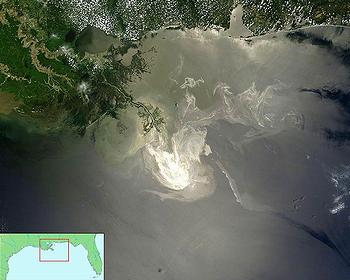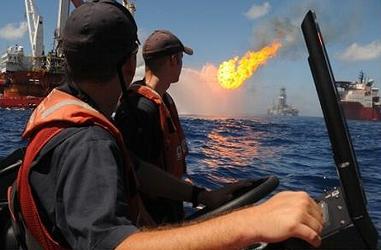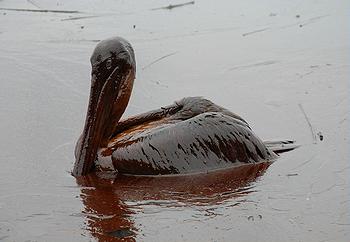BP Agrees to Pay $18.7 Billion for Gulf Oil Disaster
WASHINGTON, DC, July 2, 2015 (ENS) – British oil giant BP has reached agreements with the United States, five States and many local governments totaling $18.7 billion to settle all civil claims arising from the 2010 Deepwater Horizon oil spill in the Gulf of Mexico.
To be made in stages over 18 years, the payments will compensate the United States for Clean Water Act violations and natural resource damages and cover economic claims made by state and local governments.
BP’s U.S. upstream subsidiary, BP Exploration and Production Inc., BPXP, today executed the agreements with the U.S. government, five Gulf Coast states: Alabama, Florida, Louisiana, Mississippi and Texas and more than 400 local governments.

Sunlight illuminated the BP oil spill off the Mississippi Delta, May 24, 2010. (Image captured by the Moderate-Resolution Imaging Spectroradiometer (MODIS) on NASA’s Terra satellite.)
Known as agreements in principle, these deals are to be followed by definitive agreements, including a Consent Decree with the United States and the five Gulf states that will be subject to public comment and final court approval.
The Deepwater Horizon oil spill – the largest accidental marine oil spill in the history of the petroleum industry – began on April 20, 2010 in the Gulf of Mexico on the BP-owned, Transocean-operated Macondo Prospect about 40 miles southeast of the Mississippi Delta.
Following the explosion and sinking of the Deepwater Horizon oil rig, a sea-floor oil gusher flowed for 87 days, until it was capped on July 15, 2010. Eleven men from the rig were never found.
The U.S. government estimated the total oil discharge at 4.9 million barrels, or 210 million gallons of crude oil. After several failed efforts to contain the gusher, the well was declared sealed on September 19, 2010, but not before oil had fouled thousands of miles of the Gulf of Mexico shoreline in five states and the waters of the Gulf, with profound environmental and economic consequences.
Today, U.S. Attorney General Loretta Lynch said, “Since the Deepwater Horizon oil spill – the largest environmental disaster in our nation’s history – the Justice Department has been fully committed to holding BP accountable, to achieving justice for the American people and to restoring the environment and the economy of the Gulf region at the expense of those responsible and not the American taxpayer.”

U.S. Coast Guard members stand by as response vessels flare spilled oil and gas and work to kill the broken oil well a mile beneath the surface of the Gulf, July 8, 2010. (Photo by Petty Officer 1st Class Matthew Belson courtesy USCG)
In December 2010, then Attorney General Eric Holder filed a civil lawsuit against BP and its co-defendants. Lynch said that during that lawsuit the Justice Department proved that “BP’s gross negligence resulted in the Deepwater disaster.”
“If approved by the court, this settlement would be the largest settlement with a single entity in American history,” Lynch said. “It would help repair the damage done to the Gulf economy, fisheries, wetlands and wildlife; and it would bring lasting benefits to the Gulf region for generations to come.”
Lynch expressed gratitude to the Deepwater civil trial team, made up of men and women from the Justice Department’s Environment and Natural Resources Division and Civil Division. She credited the departments of Homeland Security, Interior, Commerce and Agriculture and the Environmental Protection Agency as well as the state leaders and environmental professionals “who collaborated to advance this agreement in principle.”
Some environmentalists were less appreciative of the agreements.
“While BP can write a fat check and think it’s putting this disaster behind it, the Gulf is still far from recovered,” said Miyoko Sakashita of the Center for Biological Diversity. “For the thousands of dolphins, turtles, birds and fish that died – plus the 11 men who died in the explosion – there is no coming back.”

Oiled pelican greeted Louisiana Governor Bobby Jindal on his visit to the damaged Gulf Coast, June 3, 2010. (Photo courtesy Louisiana Governor’s Office of Homeland Security and Emergency Preparedness)
Sakashita says the Obama Administration should have done more to prevent future marine oil spills.
“The Obama Administration has yet to implement significant reforms to make sure this never happens again,” she said. “In fact, the administration has been pushing for more offshore drilling in the Gulf and the Atlantic, and fracking existing wells to maximize their flow. I hate to say it, but there’s a good chance we’ll see something like the BP disaster again in the not-so-distant future.”
If the agreements announced today are approved, payments will extend over 18 years.
BPXP is to pay the United States a civil penalty of $5.5 billion under the Clean Water Act, payable over 15 years.
BPXP will pay $7.1 billion to the United States and the five Gulf states over 15 years for natural resource damages. This is in addition to the $1 billion already committed for early restoration.
BPXP will also set aside an additional amount of $232 million to be added to the natural resource damages interest payment at the end of the payment period to cover any further natural resource damages that are unknown at the time of the agreement.
A total of $4.9 billion will be paid over 18 years to settle economic and other claims made by the five Gulf Coast states.
Up to $1 billion will be paid to resolve claims made by more than 400 local government entities.
The expected impact of these agreements would be to increase the cumulative pre-tax charge associated with the Deepwater Horizon accident and spill by around $10 billion from $43.8 billion at the end of the first quarter to a total of about $53.8 billion.
Natural resource damages and Clean Water Act payments are scheduled to start 12 months after the agreements become final.
Total payments for natural resource damages, Clean Water Act and State claims will be made at a rate of around $1.1 billion a year for the majority of the payment period.
Carl-Henric Svanberg, BP’s chairman, said, “Five years ago we committed to restore the Gulf economy and environment and we have worked ever since to deliver on that promise. We have made significant progress, and with this agreement we provide a path to closure for BP and the Gulf. It resolves the company’s largest remaining legal exposures, provides clarity on costs and creates certainty of payment for all parties involved.
“In deciding to follow this path, the Board has balanced the risks, timing and consequences associated with many years of litigation against its wish for the company to be able to set a clear course for the future,” said Svanberg.
Bob Dudley, BP’s group chief executive, said, “For BP, this agreement will resolve the largest liabilities remaining from the tragic accident and enable BP to focus on safely delivering the energy the world needs.”
BP’s chief financial officer, Brian Gilvary, said, “The impact of the settlement on our balance sheet and cashflow will be manageable and enables BP to continue to invest in and grow its business, underpinned by a resilient and robust financial framework.”
Some environmentalists say BP has proposed to pay just a fraction of what the company should pay.
Oceana’s vice president for the United States, Jacqueline Savitz, called the agreements “a disappointment to those who believe that the company should pay the full cost of the damages it caused. $18.7 billion may sound like a lot of money, and it is, but it pales in comparison to what BP really owes.”
The Clean Water Act violations alone should have amounted to $13.7 billion, since the court found in January that BP was “grossly negligent,” said Savitz.
“Later this year, a judge was expected to rule on how much BP would have had to pay under this statute, which could have gone as high as $13.7 billion. However, if the court approves today’s proposal, BP will only be paying $5.5 billion of this amount, falling well short of what it should have been fined given the negligence finding,” Savitz said.
Under the Oil Pollution Act, BP must pay to restore the natural resources it damaged. The exact amount is still being calculated by the National Oceanic and Atmospheric Administration, but based on the amount paid for the much smaller Exxon Valdez oil spill, these damages could be much higher than the $7.1 billion BP is proposing to pay in this settlement, she said.
“For these two payments alone, Clean Water Act violations and natural resource damages, BP would be getting away with less than half of what the law justifies,” said Savitz.
The agreements announced today do not cover the remaining costs of the 2012 class action settlements with the Plaintiffs’ Steering Committee for economic and property damage and medical claims.
They also do not cover claims by individuals and businesses that opted out of the 2012 settlements and/or whose claims were excluded from them. BP will continue to defend those claims, the company said. Today’s agreements in principle also do not resolve private securities litigation pending.
BP has already settled criminal charges related to the oil spill. In November 2012, BP pleaded guilty to 11 felony manslaughter charges, environmental crimes, and obstruction of Congress and was sentenced to pay $4 billion in criminal fines and penalties, restitution and community service.
Copyright Environment News Service (ENS) 2015. All rights reserved.
http://ens-newswire.com/2015/07/02/bp-agrees-to-pay-18-7-billion-for-gulf-oil-disaster/